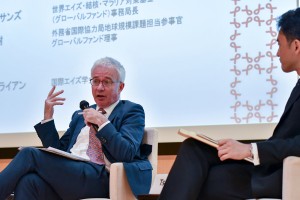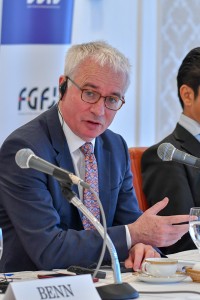Peter Sands, executive director of the Global Fund for AIDS, Tuberculosis and Malaria, visited Japan on April 23–24, 2018, together with Christoph Benn, director of external relations; Osamu Kunii, head of the Strategy, Investment & Impact Division; and Makiko Takayama, a specialist from the Donor Government Department, External Relations Division. The visit came just seven weeks after Mr. Sands took office.
(For the details of his visit, please click here)
The major messages he conveyed during the various meetings during his visit are summarized here:
 “We can now talk meaningfully not only about saving lives but about ending the pandemic”
“We can now talk meaningfully not only about saving lives but about ending the pandemic”
Thanks to the efforts of Global Fund and its partners all over the world, a remarkable 22 million lives have been saved and a one-third reduction has been achieved in the number of deaths from the three major infectious diseases since the Global Fund was established in 2002. Despite the challenges that remain, the end of the epidemics has become an achievable target due to the progress of research and medical technology.
Treatment of HIV/AIDS has greatly advanced over the past 20 years. Once known as a life-threatening disease, AIDS has become manageable with anti-retroviral treatment. But while there has been a decrease in the number of AIDS-related deaths, more than 80 percent of new infections in Sub-Saharan Africa are adolescent girls and young women aged 15 to 25. There are 8,000 girls and young women infected with HIV each week. In Asia Pacific, key population including men who have sex with men (MSM), people who inject drugs (IDU) and sex workers continue to be most affected by AIDS. AIDS control measures must address human rights violations faced by the key population. In addition to HIV prevention efforts, access to healthcare services is another challenge.
Tuberculosis has replaced AIDS as the infectious disease with the highest death toll. Each year, an estimated 4 million of the 10 million new cases go missing—i.e., they are not diagnosed, treated, or reported. This is also one of the reasons for the increasing number of drug-resistant TB cases. In order to end the TB epidemic, efforts must be made to find and treat the missing cases. India has the most TB patients in the world and has stepped up its fight against TB. At the TB Summit earlier this year, Indian Prime Minister Narendra Modi vowed to “end TB in India by 2025,” in part by doubling the budget for TB control and spending an additional $100 million for patient support. Strong political leadership like that India has demonstrated is needed in other countries with a high TB burden. Japanese Ambassador to the UN Koro Bessho will co-chair a UN High-Level Meeting on TB on September 26, 2018. The world has high expectations for the leadership of Japan, a country that successfully combated TB in the postwar period, to play an important role in ending TB.
Malaria-related deaths have decreased by half in the last 10 years due to the distribution of mosquito nets and greater access to diagnosis and treatment. However, there is a concern that drug-resistant malaria is expanding in the Greater Mekong region and measures on a regional scale will be required. In addition to country-based support, the Global Fund launched the comprehensive Regional Artemisinin-resistance Initiative (RAI) in 2013. Also, at the Malaria Summit in London on April 17, the British government and the Bill & Melinda Gates Foundation announced matching funds of £100 million and £50 million respectively, leveraging support from the private sector. At the same summit, five agrichemical companies, including Sumitomo Chemical, made a joint announcement supporting research and development of innovative products to fight malaria. History has shown that we are either winning or losing—malaria resurgence happens when we slow down our effort. We need local governments to deploy resources and keep fighting until malaria is eliminated.
Appreciation and expectations of Japan
At the G8 Kyushu-Okinawa Summit in 2000, Japan, as the host country, made infectious diseases one of the top items on the agenda, which paved the way to the establishment of the Global Fund. Japan’s contributions to date total $3.1 billion, including the latest contribution of $282 million for 2018. Mr. Sands expressed his sincere appreciation to Japan for its continued support of the Global Fund. In addition to its financial contributions, Japan’s intellectual contributions in shaping policy in the global health field and Japanese technology have also contributed greatly to the fight against infectious diseases. In addition to the UN High-Level Meeting on TB this year, Japan will host a series of important meetings in 2019, including the G20 Summit, TICAD VII, and the UN High-Level Meeting on UHC. Mr. Sands expects that Japan will continue to show strong leadership in the global health field, including in the fight against infectious diseases, and stated that the Global Fund is ready to support Japan to make these meetings successful.
Cooperation with civil society
For the Global Fund, civil society plays a number of very important roles. Civil society is the voice of the people living with AIDS, TB, and malaria, who otherwise may not be heard. Civil society also keeps the Global Fund grounded in reality, as their work on the ground informs the Global Fund as to what works and what should be changed. Civil society organizations are also powerful advocates, raising awareness among politicians and the media about the need to fight against infectious diseases. Mr. Sands stressed his wish to work closely with civil society to end the three diseases.
